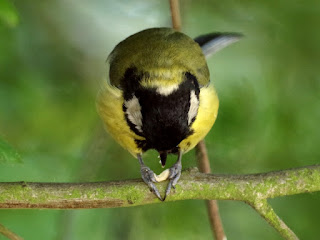You wouldn't expect a bird this age to have to fend for itself, but its parents have lost interest in it as they are busy with their second clutch of eggs in the nest on the island.
We all hope the young bird manages to get enough food and quickly acquires fishing skills.
The grebes on the Long Water have lost their two very small chicks. Undaunted, they have laid more eggs. This picture shows them changing places on the nest.
The arriving bird is turning over the eggs to keep them evenly warmed. The departing one is going off for half an hour's fishing, and then they will change places again.
An Egyptian Goose on the Serpentine has moulted early and is already regrowing its flight feathers, still in their blue wrappings.
This Greylag Goose is also ahead of the others. While they are flightless, geese rush around on the water. At some point when their new feathers have grown enough, they will do this and find that they are airworthy again.
A pair of Red-Crested Pochards were preening near the Lido.
Two Mistle Thrushes were hopping around on the grass near Queen's Gate. One of them caught and ate a large fly.
A Robin was singing beside the Long Water. It came down to my hand and carefully collected three pine nuts before flying away.
A Great Tit was eating a pine nut, clamping it to a twig with both feet and pecking pieces out of it.
A Jackdaw near the Italian Garden was waiting for me to stop photographing and give it a peanut.
I gave a peanut to this young Carrion Crow, but it hadn't yet learnt how to open the shell. After several tries it gave up.
So I broke open the shell for it and gave it the nuts, which it happily ate. It will soon learn how to deal with a peanut shell, and indeed to open all kinds of humans' food packages.
Both the Little Owls could be seen in their chestnut tree near the leaf yard. The male was on a branch with his back to the light ...
... but the female was showing well on top of the branch that has the entrance to their nest.










Great videos! They do make the blog even more interesting.
ReplyDeletePoor little Grebe. Is it normal for the parents to lose interest in it when it's not yet fully developed? I have hope that it'll make it though.
Naive that I am, I was content thinking that Great Crested Grebe chicks would be safe while carried on their parent's back. What happened to the poor chicks?
Yep, that Jackdaw looks plenty annoyed.
It's normal for many birds with only one surviving chick to abandon it and start again. Several possible offspring rate more than one actual one. I have no idea what happened to the chicks on the Long Water. They are safer on their parent's back than most young water birds, but danger still threatens from every direction.
DeleteBTW, that bit of preening the young Crow does at then end of the video when it's not managed to shell the peanut - my canary bird used to do that too. When it was stressed or frustrated, it would preen its feathers. Perhaps all birds do that as as self-soothing behaviour?
ReplyDeleteIt's what a psychologist would call displacement activity.
Delete